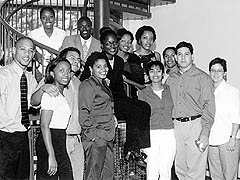|
|
Program promotes graduate school
By Caroline Moseley
|
|
|
|
|
That was the reaction of Lia Lynch, a senior English major at Hunter College, to her Princeton Summer Research Experience.
This is a program sponsored by the Graduate School to provide research opportunities with current faculty members for minority undergraduates from institutions other than Princeton. Its goal is to encourage minority students to pursue graduate study, whether in the humanities, social sciences, natural sciences or engineering.
Lynch, who says she "would very much like to teach English Literature on the college level before I die," worked with Joanna Picciotto, instructor in English. Picciotto is currently engaged in a study of the relation between science and literature in the late 17th and early 18th centuries.
The two found an area of common interest in the concept of curiosity, which, Lynch says, "was originally negative. It became positive in the 17th century, with that period's increased focus on experimental science (think Francis Bacon and Robert Boyle)." In this context, says Lynch, "I immediately thought of Pandora," whose curiosity unleashed trouble on the world when she opened a forbidden box, according to Greek mythology, and she wrote a paper on "how Pandora was represented in plays and poetry."
Lynch describes the summer program as "fantastic. I never knew how many search engines there were out there. The Princeton library is incredible, and Professor Picciotto introduced me to a variety of authors I never knew existed." She also gained "a ton of information on applications to, financial aid for, and what life is like in, graduate school."
21 successful applicants
According to David Redman, associate dean of the Graduate School, applicants for the program "had to be strongly recommended by their own faculty members. In addition, they had to be seriously interested in going to graduate school, have a very good undergraduate transcript, and of course have interests that could be met by a faculty member here."
Twenty-one successful applicants lived on campus from June 14 to August 13, working on projects with individual faculty advisers. Some students worked on their own projects, some on projects their advisers already had under way; and some did both. Typically, says Redman, "the project reflected a mutual interest that was developed with the faculty adviser and was followed up in weekly meetings to discuss research design and progress." Students gave oral presentations to the group and a paper at program's end.
The advisers suggested readings, critiqued drafts of papers, connected the students with other relevant faculty, and provided advice about graduate school and PhD study in general. The program offered sessions on such topics as "Paths to Graduate Study," "Environments of Graduate Study," "Admission to and Financial Aid for Graduate School" and "Balancing Academic Life and Personal Life."
Responsibilities, expectations
Guarionex Jordan Salivia, a student at the University of Puerto Rico, says he "found out about the program at my university during a graduate school information session in the fall of 1998, at which Princeton was represented by Dean Redman."
This summer he had "the opportunity to conduct research in pure math, which I've never done before, in one of the best universities in math--and on top of that, with Professor Charles Fefferman, who is one of the best mathematicians in the world. The program showed me what it is like to be a graduate student in terms of responsibilities, amount of work and expectations."
Elvis Dieguez, a senior at the University of Miami, worked with Professor of Physics Lyman Page, who declares himself "a strong believer that the best way to learn physics is by doing research." Dieguez reports that he spent his summer "doing calculations necessary in order to build an interferometer--mostly mathematics, some computer programming and much physics." The experience, he says, "increased my love of physics and my desire to do research in the field."
Literature, political theory
Faculty advisers found that they, too, benefited by the program.
Assistant Professor of Politics Oliver Avens worked with Shanaysha Furlow of the University of Maryland on an exploration of how literature is used to convey political theory. Though his involvement in the program was motivated simply by "the interest I have in introducing students to the richness of my field," Avens found that the summer's discussions about the 18th-century philosopher Jean-Jacques Rousseau "made me rethink how I will teach Rousseau."
Stanley Katz, lecturer with the rank of professor in public and international affairs, worked with Jonathan Gillespie of Long Island University on the student's project on the Independent Prosecutor statute. Though this was not the professor's own subject, Katz says it offered him "the satisfaction of working with a promising, hardworking student," whom he now plans to help go on to graduate school.
